The Intel Core i9-9900K at 95W: Fixing The Power for SFF
by Ian Cutress on November 29, 2018 8:00 AM ESTCPU Performance: Office Tests
The Office test suite is designed to focus around more industry standard tests that focus on office workflows, system meetings, some synthetics, but we also bundle compiler performance in with this section. For users that have to evaluate hardware in general, these are usually the benchmarks that most consider.
All of our benchmark results can also be found in our benchmark engine, Bench.
PCMark 10: Industry Standard System Profiler
Futuremark, now known as UL, has developed benchmarks that have become industry standards for around two decades. The latest complete system test suite is PCMark 10, upgrading over PCMark 8 with updated tests and more OpenCL invested into use cases such as video streaming.
PCMark splits its scores into about 14 different areas, including application startup, web, spreadsheets, photo editing, rendering, video conferencing, and physics. We post all of these numbers in our benchmark database, Bench, however the key metric for the review is the overall score.
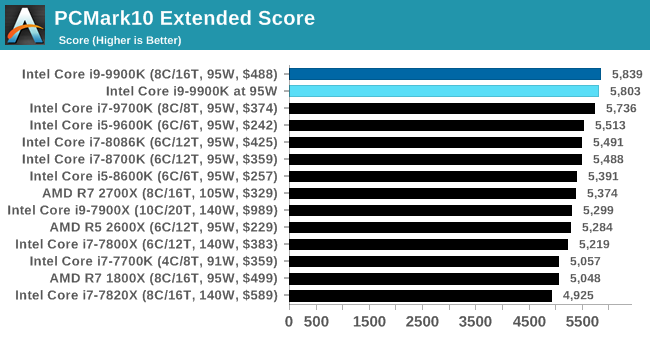
PCMark10 is more forgiving, as it has lots of pauses and only a few full-on power tests, emphasising single core speed. There isn't much lost when in 95W mode here.
Chromium Compile: Windows VC++ Compile of Chrome 56
A large number of AnandTech readers are software engineers, looking at how the hardware they use performs. While compiling a Linux kernel is ‘standard’ for the reviewers who often compile, our test is a little more varied – we are using the windows instructions to compile Chrome, specifically a Chrome 56 build from March 2017, as that was when we built the test. Google quite handily gives instructions on how to compile with Windows, along with a 400k file download for the repo.
In our test, using Google’s instructions, we use the MSVC compiler and ninja developer tools to manage the compile. As you may expect, the benchmark is variably threaded, with a mix of DRAM requirements that benefit from faster caches. Data procured in our test is the time taken for the compile, which we convert into compiles per day.
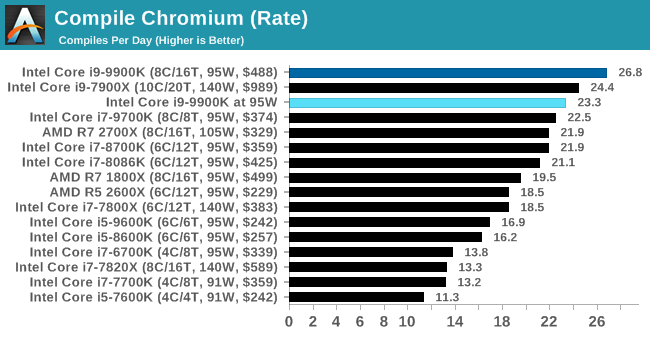
The 95W mode causes a small decrease in performance in our compile test, again moving it within a small margin to the Core i7-9700K.
3DMark Physics: In-Game Physics Compute
Alongside PCMark is 3DMark, Futuremark’s (UL’s) gaming test suite. Each gaming tests consists of one or two GPU heavy scenes, along with a physics test that is indicative of when the test was written and the platform it is aimed at. The main overriding tests, in order of complexity, are Ice Storm, Cloud Gate, Sky Diver, Fire Strike, and Time Spy.
Some of the subtests offer variants, such as Ice Storm Unlimited, which is aimed at mobile platforms with an off-screen rendering, or Fire Strike Ultra which is aimed at high-end 4K systems with lots of the added features turned on. Time Spy also currently has an AVX-512 mode (which we may be using in the future).
For our tests, we report in Bench the results from every physics test, but for the sake of the review we keep it to the most demanding of each scene: Cloud Gate, Sky Diver, Fire Strike Ultra, and Time Spy.
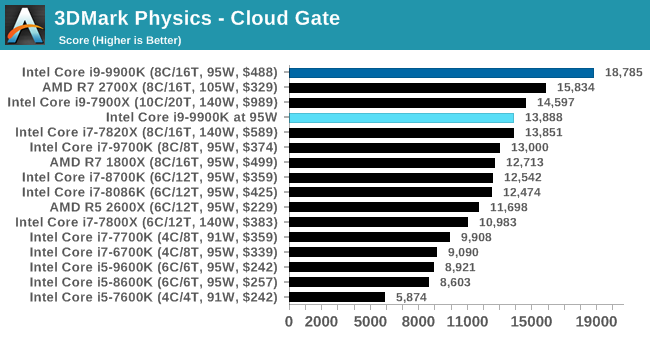
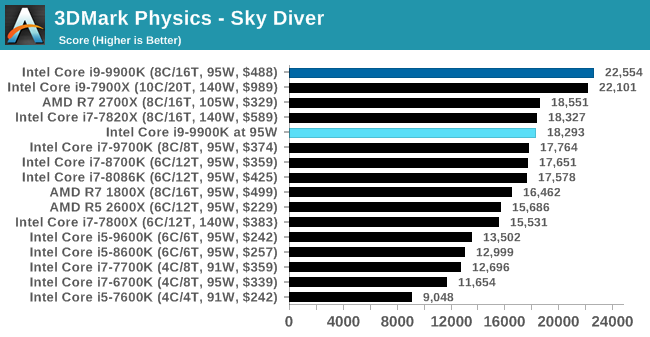
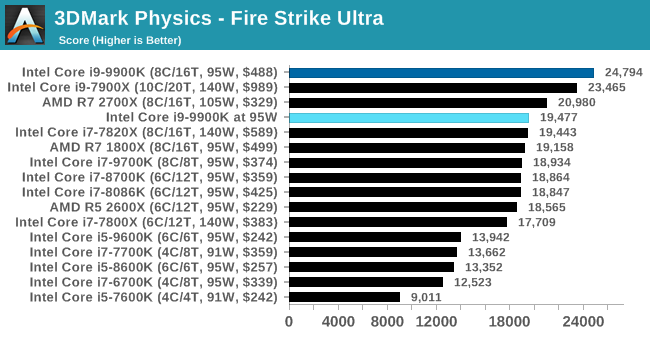
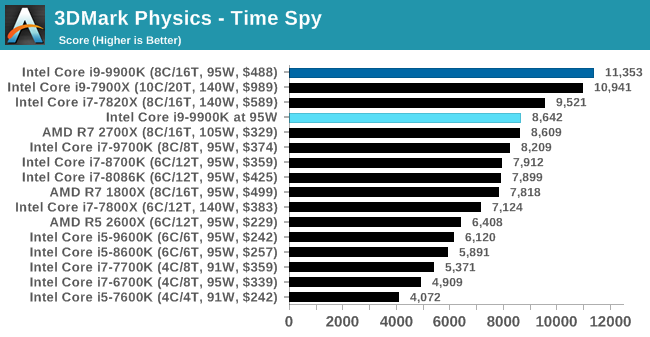
GeekBench4: Synthetics
A common tool for cross-platform testing between mobile, PC, and Mac, GeekBench 4 is an ultimate exercise in synthetic testing across a range of algorithms looking for peak throughput. Tests include encryption, compression, fast Fourier transform, memory operations, n-body physics, matrix operations, histogram manipulation, and HTML parsing.
I’m including this test due to popular demand, although the results do come across as overly synthetic, and a lot of users often put a lot of weight behind the test due to the fact that it is compiled across different platforms (although with different compilers).
We record the main subtest scores (Crypto, Integer, Floating Point, Memory) in our benchmark database, but for the review we post the overall single and multi-threaded results.
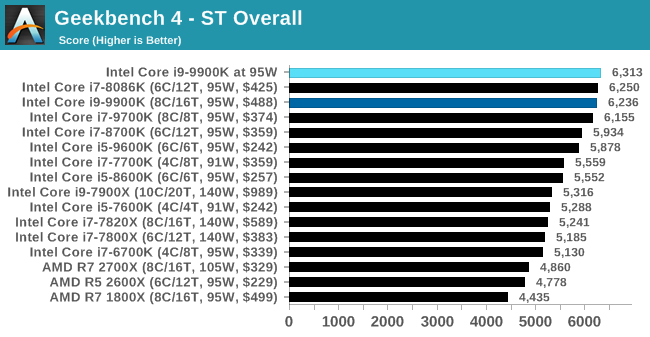
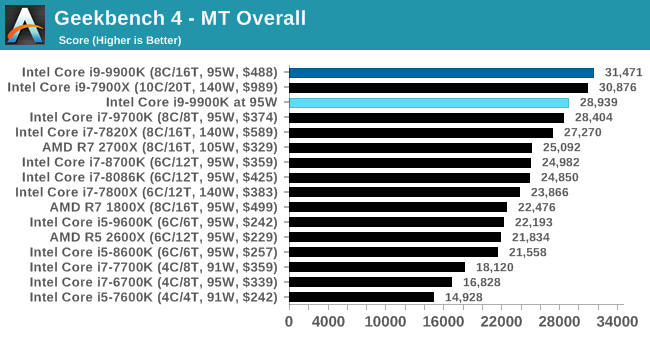










101 Comments
View All Comments
Alexvrb - Thursday, November 29, 2018 - link
Yes yes, all those office workers running a 9900K would barely notice. Serious, man? The whole reason this issue came to light was because gamers and other demanding users complained that the processor at DEFAULT settings on pretty much any retail board was annihilating TDP, even more noticeably so than their previous flagship. Journalists are lagging well behind, and when they DO bother looking into it, it's very much a "yeah it's true, shrug" article.Gastec - Wednesday, June 19, 2019 - link
Well said, "shrugging". Automagically overclocked CPU's do make benchmark graphs look better and CPUs sell better. Reminds me of one of AngryJoe's video about a certain MMO: "Oh, you want more? That would be $15 please! $15 more, please! That would be another $15!" Same with Intel, you want more performance, that would be 75% to 100% more watts, please! Yeah, I get it. Want 10 Ghz on all cores? 1000 W, what's the problem?koaschten - Thursday, November 29, 2018 - link
Check https://www.youtube.com/watch?v=kmAWqyHdebILindseyLopez - Wednesday, December 19, 2018 - link
nonicolaim - Thursday, November 29, 2018 - link
Missing link to TDP article on first page.Exodite - Thursday, November 29, 2018 - link
Thanks for this!It would be interesting, though perhaps not entirely related to this article in particular, to get a comparison on actual power draw and load temperatures as well. Similar to what you provide in your usual CPU reviews, to get a fair comparison to both the "unlocked" 9900K as well as the other slew of processors in the bench.
I'd imagine the 9900K would look much better on those numbers, though obviously worse on performance, when actually adhering to TDP.
Wingartz - Thursday, November 29, 2018 - link
*You can read it all [here], although what it boils down to is this diagram*[here] doesn't have a link to the article
:nudge> - Thursday, November 29, 2018 - link
For easy comparisons it's great to see Geekbench making an appearanceAlexvrb - Friday, November 30, 2018 - link
*worthless comparisons barely better Dhrystone and WhetstoneSirMaster - Thursday, November 29, 2018 - link
How many people are actually buying a $500 CPU and capping it's power limit to 95W?Can't be many, how about buy a different CPU if you plan on capping it's power limit like that.
I have an SFF mini-ITX build and my old overclocked haswell CPU is running at like 180W and staying cool just fine.